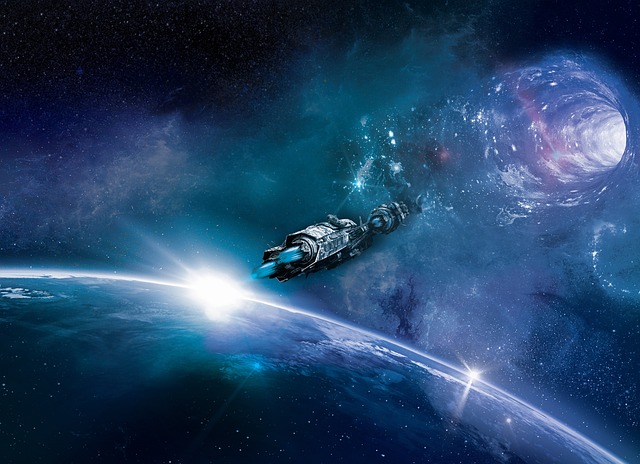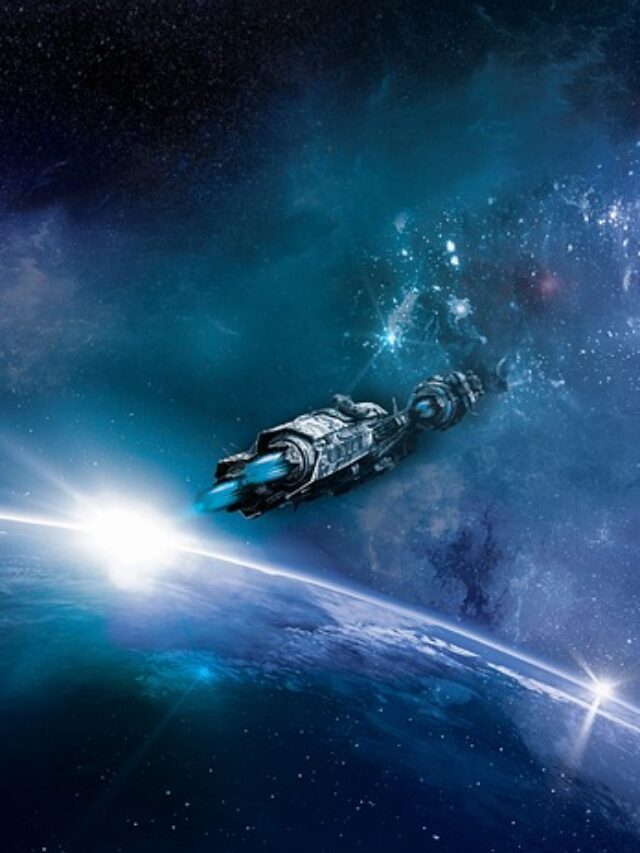Blue Origin Lands $3.4 Billion NASA Contract to Reach for the Moon: Jeff Bezos’ Rocket Company Takes Giant Leap in Lunar Exploration

In a significant development, Jeff Bezos‘ space exploration company, Blue Origin, has secured a substantial $3.4 billion contract from NASA. The contract is aimed at the development of a lunar lander named Blue Moon, which will enable the transportation of astronauts to the surface of the moon. This exciting milestone comes two years after Blue Origin narrowly missed out on a similar contract to SpaceX, owned by Elon Musk.
Under the terms of the contract, NASA will be responsible for delivering astronauts to lunar orbit using their own rockets and capsules. However, the agency seeks to leverage the expertise and capabilities of private companies like Blue Origin to continue the mission from there. Blue Origin has committed significant additional funding to support the establishment of a permanent human presence on the moon, signaling their long-term commitment to lunar exploration.
The awarding of the contract to Blue Origin aligns with NASA’s Artemis program, an ambitious initiative focused on returning to the moon for the first time in over half a century. The program kicked off with a successful test flight last year, and upcoming missions will involve Canadian and U.S. astronauts orbiting the moon. Blue Origin, along with SpaceX, plans to conduct unmanned landing tests on the moon before embarking on crewed missions. Blue Moon, the reusable lunar lander designed by Blue Origin, will be launched using the company’s New Glenn rocket, bringing us one step closer to a new era of lunar exploration.
This contract represents a significant leap forward in the efforts to expand human presence beyond Earth, paving the way for scientific discovery, technological advancements, and the potential for future space colonization. The collaboration between NASA and Blue Origin, along with other industry partners, holds the promise of unlocking new frontiers and inspiring generations to dream big about the possibilities that lie beyond our home planet.
Blue Origin Tour
Blue Origin Web Story
FAQs
On the basis of queries here are some frequently asked questions (FAQs) about Blue Origin. After go through these you’ll know more about this –
1. What is Blue Origin?
Ans. Blue Origin is a private aerospace manufacturer and spaceflight services company founded by Jeff Bezos in 2000. It aims to make space more accessible and affordable through the development of reusable rockets and spacecraft.
2. What does Blue Origin do?
Ans. Blue Origin designs, builds, and launches rockets and spacecraft for various purposes, including satellite deployment, human spaceflight, and scientific research. It focuses on developing reusable rocket technology to lower the cost of space travel and enable sustainable space exploration.
3. What is the New Shepard rocket?
Ans. The New Shepard rocket is a suborbital launch vehicle developed by Blue Origin. It is designed to take payloads, such as scientific experiments or commercial payloads, to the edge of space. It features a reusable booster and capsule, with vertical takeoff and landing capabilities.
4. What is the New Glenn rocket?
Ans. The New Glenn rocket is an orbital launch vehicle currently under development by Blue Origin. It is intended to deliver payloads, including satellites and crewed missions, to Earth orbit. The New Glenn will also feature a reusable booster, enabling cost-effective and sustainable space launches.
5. Has Blue Origin achieved any milestones in spaceflight?
Ans. Blue Origin has achieved several milestones in spaceflight. They successfully launched and landed their New Shepard rocket multiple times, demonstrating the reusability of the system. Blue Origin has also conducted various tests to ensure the safety and reliability of their vehicles, including crew escape system tests.
6. Does Blue Origin have plans for human spaceflight?
Ans. Yes, Blue Origin is actively working towards human spaceflight capabilities. They have plans for the New Shepard rocket to carry passengers on suborbital space tourism flights. Additionally, they are developing the New Glenn rocket to support crewed missions to Earth orbit.
7. How can I book a flight with Blue Origin?
Ans. If you want to book a flight with Blue Origin and experience the awe-inspiring journey into space, you’re in luck! Named after Alan Shepard, the first U.S. astronaut, Blue Origin’s New Shepard spacecraft offers an extraordinary adventure. Launching from the high West Texas desert, this 11-minute flight takes you to over 3 times the speed of sound as you soar past the Kármán Line at 100 km (62 mi). During your flight, you’ll have the incredible opportunity to float weightless for several minutes, witnessing breathtaking views of our planet that are sure to leave a lasting impression. As you descend gently back to Earth under parachutes, you’ll reflect on this life-changing experience. So, if you’re ready to embark on this extraordinary journey, don’t wait any longer. Book your flight with Blue Origin now and make your dreams of space travel a reality! Use this link – https://www.blueorigin.com/new-shepard/fly
8. What are Blue Origin’s long-term goals?
Ans. Blue Origin’s long-term goals include enabling a future where millions of people can live and work in space. They envision a future where space resources are utilized, space tourism is common, and space exploration becomes more accessible.
9. How does Blue Origin’s rocket reusability work?
Ans. Blue Origin’s rocket reusability is based on their philosophy of vertical integration and vertical landing. The rockets are designed to be fully reusable, with both the boosters and capsules capable of landing vertically after launch. This approach reduces costs by allowing the same rocket components to be used multiple times, making space travel more affordable and sustainable.
10. What is the significance of Blue Origin’s focus on reusable rockets?
Ans. Blue Origin’s focus on reusable rockets is significant because it aims to revolutionize space travel and exploration. By developing reusable rocket technology, Blue Origin intends to significantly reduce the cost of launching payloads into space. This cost reduction opens up possibilities for increased scientific research, satellite deployment, and even human colonization of other celestial bodies.
11. How does Blue Origin compare to other private space companies like SpaceX?
Ans. Blue Origin and SpaceX are both private space companies with similar goals of making space more accessible. However, they differ in their primary focus and approach. Blue Origin’s initial focus is on suborbital flights and developing a reliable and reusable launch system. SpaceX, on the other hand, has placed a strong emphasis on orbital missions and cargo resupply to the International Space Station (ISS). Both companies have made significant contributions to the commercial space industry.
12. What is Blue Origin’s stance on environmental sustainability?
Ans. Blue Origin recognizes the importance of environmental sustainability and strives to minimize the environmental impact of its operations. The development of reusable rockets and spacecraft is part of this commitment, as it reduces the need for disposable launch systems and decreases space debris. Blue Origin also considers environmental considerations in its manufacturing and launch processes to ensure sustainable practices.
13 Does Blue Origin have any collaborations or partnerships with other organizations?
Ans. Blue Origin has collaborated with various organizations and government agencies. They have worked with NASA on several projects, including developing technologies for crewed missions to the Moon and beyond. Blue Origin has also partnered with private companies for satellite launches and other space-related initiatives.
14. Can Blue Origin’s technology be used for interplanetary missions?
Ans. Blue Origin’s technology, particularly the New Glenn rocket currently under development, has the potential to support interplanetary missions. The powerful capabilities of the New Glenn could enable the transport of payloads and potentially humans to destinations beyond Earth’s orbit, such as the Moon, Mars, and other planets.
15. Blue Origin Vs SpaceX
Ans. On the basis of their capabilties, here’s a comparison between Blue Origin and SpaceX,
| Blue Origin | SpaceX | |
|---|---|---|
| Founders | Jeff Bezos | Elon Musk |
| Year Founded | 2000 | 2002 |
| Rocket Reusability | Strong emphasis on reusable rockets | Pioneered reusable rocket technology |
| Missions | Primarily focused on suborbital and orbital flights | Extensive satellite launches, ISS resupply, crewed missions |
| Vision | Making space more accessible, future space colonization | Revolutionizing space technology, colonization of Mars |
| Notable Projects | New Shepard, New Glenn | Falcon 9, Falcon Heavy, Starship |
| Government Collaborations | Collaborated with NASA on lunar missions | NASA Commercial Crew Program, contracts for military and national security |
| Ambitious Goals | Human presence in space, space tourism, space resource utilization | Colonization of Mars, making humanity an interplanetary species |
| Public Engagement | Limited public participation in suborbital flights | Extensive public outreach, Starship passenger announcements |
| Current Status | Developing launch systems, planning for commercial space tourism | Active satellite launches, ISS resupply, Mars colonization plans |
Please note that the information provided is based on the knowledge available in other sites. Both Blue Origin and SpaceX are dynamic companies, and their activities, achievements, and future plans may have evolved since then.
Source
Related Searches
Kennedy Space Center Visitor Complex hosting ‘Star Trek’ panel

